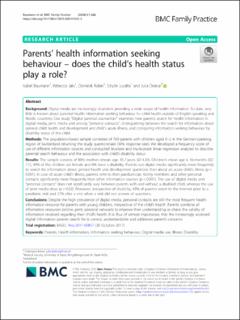Please use this identifier to cite or link to this item:
https://doi.org/10.21256/zhaw-21037Full metadata record
| DC Field | Value | Language |
|---|---|---|
| dc.contributor.author | Baumann, Isabel | - |
| dc.contributor.author | Jaks, Rebecca | - |
| dc.contributor.author | Robin, Dominik | - |
| dc.contributor.author | Juvalta, Sibylle | - |
| dc.contributor.author | Dratva, Julia | - |
| dc.date.accessioned | 2020-12-16T15:07:14Z | - |
| dc.date.available | 2020-12-16T15:07:14Z | - |
| dc.date.issued | 2020-12-10 | - |
| dc.identifier.issn | 1471-2296 | de_CH |
| dc.identifier.uri | https://digitalcollection.zhaw.ch/handle/11475/21037 | - |
| dc.description.abstract | Background: Digital media are increasingly abundant providing a wide scope of health information. To date, verylittle is known about parental health information seeking behaviour for child health outside of English-speaking andNordic countries. Our study “Digital parental counsellors” examines how parents search for health information indigital media, print media and among “personal contacts”, distinguishing between the search for information aboutgeneral child health and development and child’s acute illness, and comparing information seeking behaviour bydisability status of the child. Methods: The population-based sample consisted of 769 parents with children aged 0–2 in the German-speakingregion of Switzerland returning the study questionnaire (30% response rate). We developed a frequency score ofuse of different information sources and conducted bivariate and multivariate linear regression analyses to describeparental search behaviour and the association with child’s disability status. Results: The sample consists of 88% mothers (mean age: 35.7 years SD 4.33). Children’s mean age is 16 months (SD7.1), 49% of the children are female and 6% have a disability. Parents use digital media significantly more frequentlyto search for information about general health and development questions than about an acute child’s illness (p<0.001). In case of acute child’s illness, parents refer to their paediatrician, family members and other personalcontacts significantly more frequently than other information sources (p< 0.001). The use of digital media and“personal contacts”does not significantly vary between parents with and without a disabled child, whereas the useof print media does (p< 0.02). Moreover, irrespective of disability, 45% of parents resort to the Internet prior to apaediatric visit and 27% after a visit when a visit did not answer all questions. Conclusions: Despite the high prevalence of digital media, personal contacts are still the most frequent healthinformation resource for parents with young children, irrespective of the child’s health. Parents combine allinformation resources (online, print, personal network) to improve their understanding or check the validity ofinformation received regarding their child’s health. It is thus of utmost importance, that the increasingly accesseddigital information parents search for is correct, understandable and addresses parent’s concerns. Trial registration: BASEC Req-2017-00817 (30 October 2017). | de_CH |
| dc.language.iso | en | de_CH |
| dc.publisher | BioMed Central | de_CH |
| dc.relation.ispartof | BMC Family Practice | de_CH |
| dc.rights | http://creativecommons.org/licenses/by/4.0/ | de_CH |
| dc.subject | Parents | de_CH |
| dc.subject | Health information | de_CH |
| dc.subject | Information seeking behaviour | de_CH |
| dc.subject | Digital media use | de_CH |
| dc.subject | lllness | de_CH |
| dc.subject | Disability | de_CH |
| dc.subject.ddc | 302.23: Medien | de_CH |
| dc.subject.ddc | 610: Medizin und Gesundheit | de_CH |
| dc.title | Parents’ health information seeking behaviour : does the child’s health status play a role? | de_CH |
| dc.type | Beitrag in wissenschaftlicher Zeitschrift | de_CH |
| dcterms.type | Text | de_CH |
| zhaw.departement | Gesundheit | de_CH |
| zhaw.organisationalunit | Institut für Public Health (IPH) | de_CH |
| dc.identifier.doi | 10.1186/s12875-020-01342-3 | de_CH |
| dc.identifier.doi | 10.21256/zhaw-21037 | - |
| dc.identifier.pmid | 33302881 | de_CH |
| zhaw.funding.eu | No | de_CH |
| zhaw.issue | 266 | de_CH |
| zhaw.originated.zhaw | Yes | de_CH |
| zhaw.publication.status | publishedVersion | de_CH |
| zhaw.volume | 21 | de_CH |
| zhaw.publication.review | Peer review (Publikation) | de_CH |
| zhaw.webfeed | G: Gesundheit von Kindern und Jugendlichen | de_CH |
| zhaw.funding.zhaw | Digitale Elternratgeber | de_CH |
| zhaw.author.additional | No | de_CH |
| zhaw.display.portrait | Yes | de_CH |
| Appears in collections: | Publikationen Gesundheit | |
Files in This Item:
| File | Description | Size | Format | |
|---|---|---|---|---|
| 2020_Baumann-et-al_Parents-health-information-seeking-behaviour.pdf | 406.19 kB | Adobe PDF |  View/Open |
Show simple item record
Baumann, I., Jaks, R., Robin, D., Juvalta, S., & Dratva, J. (2020). Parents’ health information seeking behaviour : does the child’s health status play a role? BMC Family Practice, 21(266). https://doi.org/10.1186/s12875-020-01342-3
Baumann, I. et al. (2020) ‘Parents’ health information seeking behaviour : does the child’s health status play a role?’, BMC Family Practice, 21(266). Available at: https://doi.org/10.1186/s12875-020-01342-3.
I. Baumann, R. Jaks, D. Robin, S. Juvalta, and J. Dratva, “Parents’ health information seeking behaviour : does the child’s health status play a role?,” BMC Family Practice, vol. 21, no. 266, Dec. 2020, doi: 10.1186/s12875-020-01342-3.
BAUMANN, Isabel, Rebecca JAKS, Dominik ROBIN, Sibylle JUVALTA und Julia DRATVA, 2020. Parents’ health information seeking behaviour : does the child’s health status play a role? BMC Family Practice. 10 Dezember 2020. Bd. 21, Nr. 266. DOI 10.1186/s12875-020-01342-3
Baumann, Isabel, Rebecca Jaks, Dominik Robin, Sibylle Juvalta, and Julia Dratva. 2020. “Parents’ Health Information Seeking Behaviour : Does the Child’s Health Status Play a Role?” BMC Family Practice 21 (266). https://doi.org/10.1186/s12875-020-01342-3.
Baumann, Isabel, et al. “Parents’ Health Information Seeking Behaviour : Does the Child’s Health Status Play a Role?” BMC Family Practice, vol. 21, no. 266, Dec. 2020, https://doi.org/10.1186/s12875-020-01342-3.
Items in DSpace are protected by copyright, with all rights reserved, unless otherwise indicated.